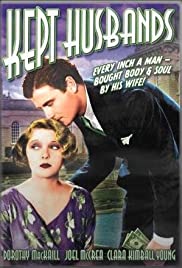
KEPT HUSBANDS
US, 1931, 76 minutes, Black and white.
Dorothy Mackaill, Joel Mc Crea, Ned Sparks, Mary Carr, Clara Kimball Young, Robert Mc Wade, Bryant Washburn, Florence Roberts.
Directed by Lloyd Bacon.
The tagline for the advertising for this film, 1931 style, “every inch a man – bought body and soul by his wife)!
For this reason, in the light of the title, the film is a curiosity item for discussions about relationships between men and women at the beginning of the 1930s, the role of the husband as a man and supporting his wife, the role of the rich woman in love with a man whom she controls, the solution that is expressed in the best way of keeping a husband is by love rather than by money and power.
The film is typical enough of its time, a short running time, the establishing of the central characters, a wealthy family in New Jersey, factory developments, possibilities of expansion, with a benign father, and absolutely snobbish mother, and a wilful daughter who sets her sights at the young man who was brought in as a manager in the company, giving herself four weeks to win him over, actually proposing herself rather than his proposing.
The young man is played by Joel Mc Crea at the beginning of his career, clearly a talent for presenting strong decent heroes on screen. Dorothy Mackaill is the spoilt young woman.
In the background is the young man’s mother, managing a boarding house, then the revelation that the young man is a sports star and has been an all-American, admired by everyone, though he does not want to capitalise on this, preferring to earn his living properly.
The young couple are in love, but the young man allows his wife to do all the planning, the honeymoon, the trips to different places,buying expensive clothing, cabling her father for extra funds…
When he does return, people of the company think that he is rather idle, as he is, studying bridge et cetera, and referred to as a kept employee.
One of the boarders at his mother’s house, played by Ned Sparks, is full of aphorisms and proverbs, which, because of their timing, bring some amusement and counterpoint to the screenplay.
Inevitably, there is a clash between the male image, provider, earning one’s keep appropriately and the spoilt life of the wife, even to her dallying with a former friend, though not cheating on her husband, but his becoming disgusted with her behaviour and her not telling the truth. She gets advice from his mother, from her father and demands from her father, eventually affecting a reconciliation with her husband.
It is interesting as a film to provide discussions for equality between men and women, the perceived roles of men and women in the past and how they changed during the 20th century.